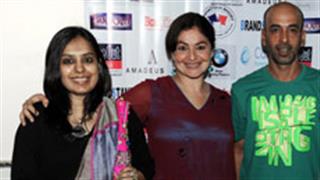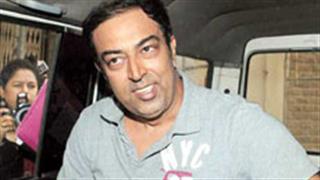From 'bikini killer' Charles Sobhraj's daring jailbreak to teenager Aarushi Talwar's sensational murder, real-life incidents have been steadily finding their way to the celluloid. The gritty realism portrayed on screen can be fascinating, pulling in the crowds. While the formula may have worked well at the box office, it has, more often than not, triggered controversy with filmmakers being accused of trying to make capital out of personal tragedies - even character assassination of the real-life victims, who 'inspire' their fiction.
In the eye of storm now is Manish Gupta's Rahasya, which is allegedly based on the Aarushi Talwar case. Her family has opposed the film's release on the plea that misrepresentation of facts would vilify the girl, who was found murdered in her Noida home along with the family's domestic help, Hemraj, in May 2008. Though the Central Board of Film Certification has dismissed speculations of similarities between the film and the incident, Aarushi's close ones are not convinced.

The victim's aunt, Shree Paradkar, who is a Canada-based journalist, argues that the makers had given several interviews about being inspired by the Aarushi-Hemraj killings and the actors having studied the case for many months.
`After our lawyer said no book can be written or movie made on the case without our consent, they suddenly claimed that Rahasya was a work of fiction. Even if it were a fictional feature film, are they so lacking in imagination that they need to frame their story on a true, unsolved crime that is still in court? They are hoping to use the tremendous interest in this case as a hook to get people to pay to see the film. This may be entertainment for them, but for us the loss of our Aarushi and the unjust conviction of her grief-stricken parents is a profound tragedy. Are they seeking to cash in on our pain?` asks Paradkar.
She says no attempt was ever made by the filmmaker to contact the family members and verify the facts. `The first act of decency would be to seek permission of the people around whom the film is being made,` she adds.
This apparent lack of basic decency is precisely the grouse of 63-year-old Amarnath Grover, whose son Neeraj, a television executive, was hacked to death by a Naval officer with the assistance of an aspiring actress. The macabre incident of 2008 became fodder for Ram Gopal Verma's film, Not A Love Story.

'Not A Love Story', Ram Gopal Varma, Mahie Gill, Neeraj Grover Murder Case, Maria Susairaj
`Just before its release in 2011, someone came forward to help me claim compensation from the director but I declined the offer. No amount of money could have brought my son back from the grave. I just wanted people to know how Neeraj was victimised but the film twisted facts and the audience believed what they saw was a true account,` rues Amarnath.
However, Neeraj's close friend and filmmaker, Nishant Lal, feels differently. `It is all about individual interpretation. You may say the case was an inspiration but there is nothing more to it. Moreover, if you have to sell a film, you cook some things up. At the cost of being interesting, you may have to distort facts,` suggests Nishant.
Director Sanjay Gupta, who was flayed by the police department for his Shootout at Wadala, echoes the opinion. `When you are making a commercial feature film, you need to dramatise certain things and make it presentable to the audience. It was not a documentary that we had to be bound by facts alone.`

But Isaque Bagwan, the hero of the shootout - recorded as the first-ever encounter by the Mumbai police resulting in the elimination of gangster Manya Surve - finds it hard to digest Sanjay's words. The retired ACP says he had given the director a no-objection certificate to make the film on his life provided there were no factual inconsistencies.
`When I saw the promos, I realised they had diluted the story. I sent them a notice to change the names of the characters and they complied. I feel they should have changed the gangster's name too, because it was Isaque who killed Manya Surve, not some fictitious character called Afaque. It was upsetting to see how fiction overshadowed facts,` says Bagwan.

Anil Kapoor, 'Shootout At Wadala', Ex-ACP Isaque Bagawan
Keen to steer clear of controversies, director Sanjay Chhel claims that he has consciously avoided basing his Kill The Rapist? on the Delhi gangrape incident for the fear of backlash. `I don't want people to say that I am trying to commercialise or sensationalise a tragic event. My credibility could be questioned. But I must admit that I started working on the film after that fateful event because the entire nation was in a state of shock and fury. Real-life incidents and news reports always act as a catalyst and spur you to do something realistic,` he says.
Experts say filmmakers do little to counter the popular perception that a film is based on a 'sensational' incident as it threatens to take the fizz out of the story - especially if the case has aroused great public curiosity.
`Semi-documentaries can do enormous damage to the victims and their families, particularly when the controversy is recent. The Censor Board must seriously consider formulating a code of ethics. There has to be some amount of sensitivity,` says sociologist Shiv Vishwanathan.
So, is there a way to balance cinematic liberties and the sentiments of a grieving family? The reel depiction of human rights lawyer Shahid Azmi by director Hansal Mehta - from his arrest during the Mumbai communal riots in 1992-1993 to becoming a criminal defense lawyer and subsequently, his murder - was almost 95 per cent accurate, certifies the Azmi family.
Another example is Rajkumar Gupta's crime thriller, No One Killed Jessica, based on the true story of slain model Jessica Lall, who was shot at a Delhi restaurant by the son of an influential politician. `While making a movie, it is important to seek approval from the victim's family and keep their emotions in mind. Efforts must be made to stick to the facts at hand and not sensationalise them. I was involved with the story from day one and the script was sent to me for my approval. So, I was not really apprehensive regarding the content,` says Jessica's elder sister, Sabrina, whose character was essayed by Vidya Balan in the film.
While the Lalls got some closure on Jessica's murder and seemed content with how No One... turned out, Aarushi's family are a long way from reconciling with the investigation into her murder, let alone a film that threatens to assassinate the character of the dead teenager.
`Everybody lapped up the lurid tales of fantasy they (the police) wove. The reaction to police reports culminated in the wrongful conviction of Aarushi's parents. How much more damaging would be the impact of a narrative by filmmakers who don't have to stick to facts at all? For the director, a few commercial interests may be threatened. But for the Talwars, two lives are at stake,` says Paradkar.
Even Neeraj Grover's father, Amarnath Grover, is desperate that nothing but the truth be told to gullible cinema-goers. `I have not given up my hunt for evidence pertaining to my son's death. If a filmmaker approaches me with the intent of presenting facts of the case on the big screen, I will help him because the audience deserves to know the truth,` he says.
Real-to-reel
Films that have apparently been inspired from real-life events
>> Madras Cafe
>> Shahid
>> Shootout At Wadala
>> Shootout At Lokhandwala
>> Special 26
>> Ankur Arora Murder Case
>> The Attacks of 26/11
>> Department
>> Black Friday
>> No One Killed Jessica
>> Khelein Hum Jee Jaan Se
In the pipeline
>> Rahasya
>> Kill The Rapist?
>> Main Aur Charles
In the line of fire
Raju Meshram, director of the Marathi film Khairlanjichya Mathyavar, based on the Khairlanji massacre of 2006, is worried about his project's prospects. Bhaiyalal Bhotmange, the lone survivor of the incident, has filed a case stalling the film's release. `They have shown me in poor light, as a coward and drunkard. Also, my daughter was not romantically involved with anyone. They did not take my permission before making the film and if released, it will mislead the audience.I don't want any compensation from them,` he says.
The director says he did not feel the need to take permission from anyone. `Bhaiyalal has no patent on this story - all the information and pictures of his wife and daughter are available online. Anyway, we showed him the film last month and he was happy about it. A day before its release, he filed a case against us because of political influences. I am willing to put up a disclaimer saying he is not a drunkard and the pictures are morphed but he is in no mood to sort out the issue,` says Meshram, adding that he has incurred heavy losses as he had spent a lot of money on promotions.













